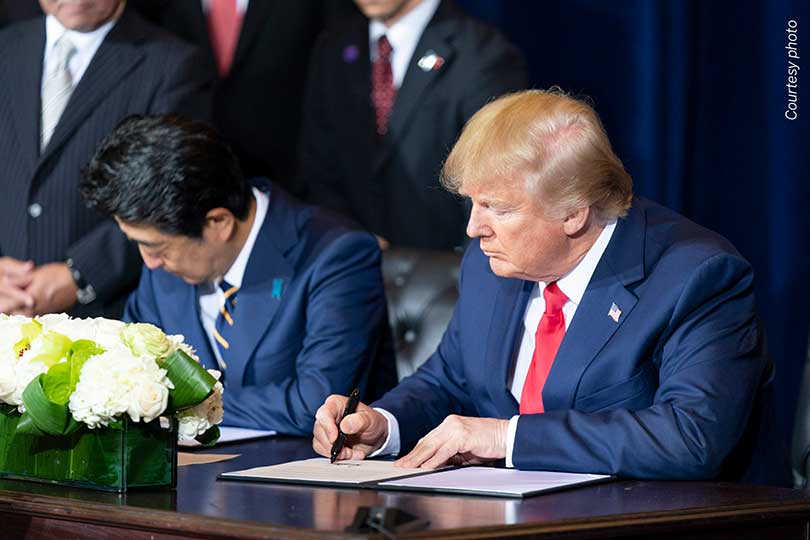By Jessica Domel
Multimedia Reporter
Nearly 90 percent of U.S. food and agricultural products sold into Japan will soon face reduced, or eliminated, tariffs thanks to a new bilateral trade agreement.
U.S. President Donald Trump and Japanese Prime Minister Shinzo Abe signed the first phase of the deal Wednesday, Sept. 25, on the sidelines of the United Nations General Assembly in New York.
“It’s a tremendous trade deal,” Trump said. “It’s a very big trade deal.”
According to Trump, Japan will open new markets to about $7 billion in U.S. agricultural products.
“Texas Farm Bureau (TFB) commends the administration for reaching a trade agreement with Japan that will expand market access for hardworking farm and ranch families,” TFB President Russell Boening said. “This agreement reduces tariffs while, in turn, easing access to Japan’s agricultural markets.”
Japan is American agriculture’s fourth-largest export destination and important to the livelihood of farms and the families across the nation, according to American Farm Bureau Federation President Zippy Duvall.
According to the U.S. Trade Representative’s Office, the tariffs on fresh and frozen U.S. beef and pork will be reduced in stages.
“We’ve seen market share declines in Japan, historically our largest value export market, since the start of the year when international competitors gained more favorable access through new trade agreements,” David Herring, National Pork Producers Council president, said. “Once implemented, the agreement signed today puts U.S. pork back on a level playing field with our competitors in Japan.”
The tariffs Japan levies on almonds, blueberries, cranberries, walnuts, sweet corn, grain sorghum, broccoli and prunes will be eliminated entirely.
There will be a staged tariff elimination on wine, cheese and whey, ethanol, frozen poultry, frozen potatoes, processed pork, oranges and egg products.
“Dairy is a big winner. It’s already a big market there for dairy (with) $750 million a year that we already export,” Steve Censky, deputy agriculture secretary, said. “Under the agreement, we’re going to have the same sort of tariff treatment, have tariff reductions for a lot of our products (like) our hard cheeses. We have some specific quotas for whey and processed cheese and skim milk powder.”
Wheat will be subject to a duty-free quota that will grow over time.
“Wheat producers are a big winner, once again,” Censky said. “Japan has been the wheat industry’s number one or number two market, in addition to our $800 million a year that we already send to Japan.”
In return, the U.S. will lower or drop tariffs on some agricultural and industrial products from Japan, such as cut flowers, persimmons, green tea, chewing gum and soy sauce.
The first phase also covers $40 billion in digital trade.
Vehicles and auto parts were not included in the trade agreement. The two countries will reportedly return to the negotiating table in a few months to discuss a second phase of the trade agreement.
Last year, the U.S. exported $13 billion in agricultural products to Japan.


Now then, we can, all get along and work together for mutual benefit. Good job.
The left needs to get out of Present Trump’s way. Could you imagine what good he could get done if he didn’t have to spend so much time fighting those swamp dwellers?